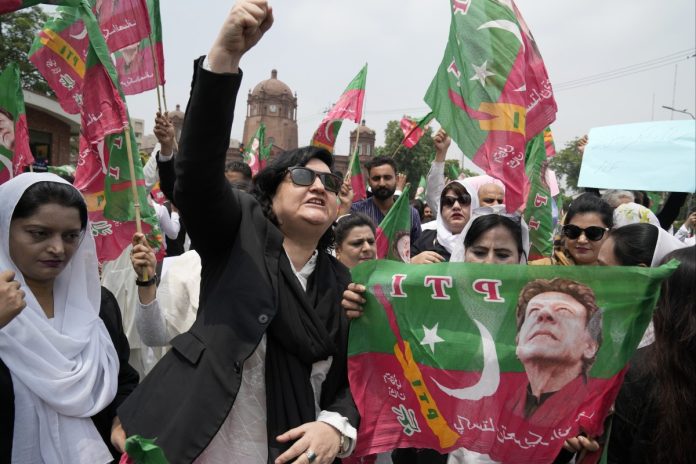
Last Saturday, police in Pakistan arrested former prime minister Imran Khan after a court sentenced him to three years in prison. He was accused of buying and selling state gifts worth around US$500,000 during his premiership from 2018-22.
Khan, a former Pakistan cricket captain turned politician, was taken into custody in May by paramilitary troops who stormed into at the Islamabad High Court to jail him on several corruption charges. Protests erupted around the country as word of Khan’s detention spread.
Armed with batons, the former prime minister’s followers targeted security institutions, including army headquarters. After he was granted bail on May 12, Khan blamed the army chief, General Syed Asim Munir, for the situation, saying, “It’s not the security institution; it is just one man, the army chief.”
Khan’s arrest is the latest development in months of political turmoil since his removal from office last year and his Pakistan Tehreek-e Insaf (PTI) party facing a crackdown, with many senior leaders arrested and forced to quit the party. Thousands of his supporters, alleged to be involved in the protests, have been arrested with the prospect of being tried in military courts.
Pakistan’s military has ruled the country for more than half its existence since gaining independence in 1947. Only three of Pakistan’s 23 prime ministers have held office for more than four years, and the country continues to operate as a partial democracy owing to the military’s control over domestic and external affairs.
Pakistan’s democratic identity is fuelled by complex tussles between two political dynasties: the Pakistan People’s Party (PPP), led by the Bhutto family, and the Pakistan Muslim League (PML-N), led by the Sharif family. For the first time, the Khan-led PTI posed a challenge to the status quo with his anti-corruption campaign and governance reform promises.
Khan’s rise to power in 2018 was the second democratic power change following Nawaz Sharif’s election in 2013.
Pakistan’s swings between military coups and quasi-democratic political regimes are reflected in the military managing border affairs as well as defence and foreign policies. For its neighbour and rival India, it has been a tricky affair engaging with leadership between these shifts, be it during Sharif’s or Khan’s rule.
Although Pakistan has maintained close ties with China, its changing terms have created a puzzling foreign policy stance for many. This is also true of its tacit support for the Afghan Taliban while being part of the international coalition opposing the same.
Khan’s party came into power in 2018, winning the support of the urban middle class who resonated with his promises of uprooting corruption and governance reforms. The military’s support for Khan is also worth mentioning, and its influence continued from the media to foreign policy.
Khan’s efforts to live up to his promises led him to challenge the status quo of political dynasties and the military. Although he was removed through a constitutional procedure, the military withdrawing its support was the turning point in his exit.
While Khan changed Pakistan’s political narrative, his anti-corruption drive mostly targeted opposition leaders. As his government became increasingly authoritarian, he tended to bypass the parliament, reflecting his distrust in the state machinery. With political turmoil resulting from weak governance and high inflation, allies jumping ship and the military withdrawing support, Khan failed to survive a no-confidence vote and left office after serving four years.
His allegations of foreign interference and deep-rooted corruption in the Pakistani establishment drew many followers and generated political momentum that made even the army nervous. There was talk that this could be a turning point in the country’s history that led to changes in Pakistan’s democratic outlook.
Khan being shot during a protest march on November 3 brought to mind the assassination of Benazir Bhutto, who at the time was bidding for a third term as prime minister. He accused Prime Minister Shehbaz Sharif, Interior Minister Rana Sanaullah and a US-led foreign conspiracy colluding with the military of plotting his assassination.
Khan’s open challenge of the establishment galvanised his rivals to unite, with Pakistan’s current ruling coalition, including formerly bitter foes the PPP and PML-N. Given the fate of those whose views do not align with the establishment, the situation was increasingly disconcerting for both Khan and Pakistan’s fragile democracy.
With the current parliament’s term ending this month, Pakistan is expected to hold elections for its national assembly no later than November. Going by history, there is little expectation that the upcoming vote will be free and fair. The ruling coalition is likely to retain power, thanks to the support of the military and keeping Khan out of the election by jailing him, thus making him ineligible to run for political office for five years.
Even if Khan’s movement helped usher in needed changes and provided the people with hope that a functional democracy could emerge, the influence of the golden triangle of Pakistani democracy – the parliament, judiciary and military – still looms large.
The question is whether a different political system will evolve in Pakistan and give its people a fair shot at achieving a viable, credible democracy that is free from the clutches of dynastic politics, established elites and, last but not least, a military that has an overarching reach in national politics.









































